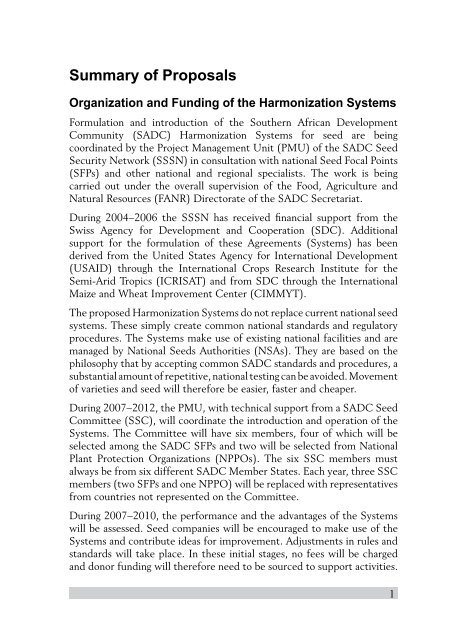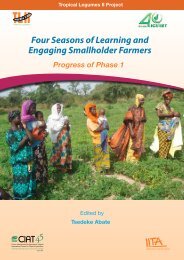Technical Agreements on Harmonization of Seed Regulations - icrisat
Technical Agreements on Harmonization of Seed Regulations - icrisat
Technical Agreements on Harmonization of Seed Regulations - icrisat
Create successful ePaper yourself
Turn your PDF publications into a flip-book with our unique Google optimized e-Paper software.
Summary <strong>of</strong> Proposals<br />
Organizati<strong>on</strong> and Funding <strong>of</strong> the Harm<strong>on</strong>izati<strong>on</strong> Systems<br />
Formulati<strong>on</strong> and introducti<strong>on</strong> <strong>of</strong> the Southern African Development<br />
Community (SADC) Harm<strong>on</strong>izati<strong>on</strong> Systems for seed are being<br />
coordinated by the Project Management Unit (PMU) <strong>of</strong> the SADC <strong>Seed</strong><br />
Security Network (SSSN) in c<strong>on</strong>sultati<strong>on</strong> with nati<strong>on</strong>al <strong>Seed</strong> Focal Points<br />
(SFPs) and other nati<strong>on</strong>al and regi<strong>on</strong>al specialists. The work is being<br />
carried out under the overall supervisi<strong>on</strong> <strong>of</strong> the Food, Agriculture and<br />
Natural Resources (FANR) Directorate <strong>of</strong> the SADC Secretariat.<br />
During 2004−2006 the SSSN has received financial support from the<br />
Swiss Agency for Development and Cooperati<strong>on</strong> (SDC). Additi<strong>on</strong>al<br />
support for the formulati<strong>on</strong> <strong>of</strong> these <str<strong>on</strong>g>Agreements</str<strong>on</strong>g> (Systems) has been<br />
derived from the United States Agency for Internati<strong>on</strong>al Development<br />
(USAID) through the Internati<strong>on</strong>al Crops Research Institute for the<br />
Semi-Arid Tropics (ICRISAT) and from SDC through the Internati<strong>on</strong>al<br />
Maize and Wheat Improvement Center (CIMMYT).<br />
The proposed Harm<strong>on</strong>izati<strong>on</strong> Systems do not replace current nati<strong>on</strong>al seed<br />
systems. These simply create comm<strong>on</strong> nati<strong>on</strong>al standards and regulatory<br />
procedures. The Systems make use <strong>of</strong> existing nati<strong>on</strong>al facilities and are<br />
managed by Nati<strong>on</strong>al <strong>Seed</strong>s Authorities (NSAs). They are based <strong>on</strong> the<br />
philosophy that by accepting comm<strong>on</strong> SADC standards and procedures, a<br />
substantial amount <strong>of</strong> repetitive, nati<strong>on</strong>al testing can be avoided. Movement<br />
<strong>of</strong> varieties and seed will therefore be easier, faster and cheaper.<br />
During 2007−2012, the PMU, with technical support from a SADC <strong>Seed</strong><br />
Committee (SSC), will coordinate the introducti<strong>on</strong> and operati<strong>on</strong> <strong>of</strong> the<br />
Systems. The Committee will have six members, four <strong>of</strong> which will be<br />
selected am<strong>on</strong>g the SADC SFPs and two will be selected from Nati<strong>on</strong>al<br />
Plant Protecti<strong>on</strong> Organizati<strong>on</strong>s (NPPOs). The six SSC members must<br />
always be from six different SADC Member States. Each year, three SSC<br />
members (two SFPs and <strong>on</strong>e NPPO) will be replaced with representatives<br />
from countries not represented <strong>on</strong> the Committee.<br />
During 2007−2010, the performance and the advantages <strong>of</strong> the Systems<br />
will be assessed. <strong>Seed</strong> companies will be encouraged to make use <strong>of</strong> the<br />
Systems and c<strong>on</strong>tribute ideas for improvement. Adjustments in rules and<br />
standards will take place. In these initial stages, no fees will be charged<br />
and d<strong>on</strong>or funding will therefore need to be sourced to support activities.<br />
1

















